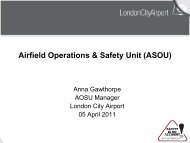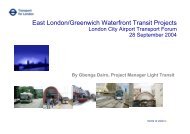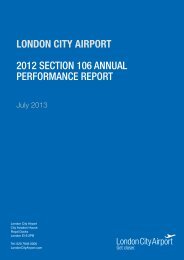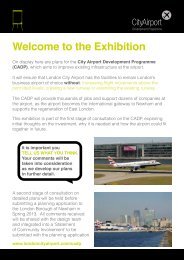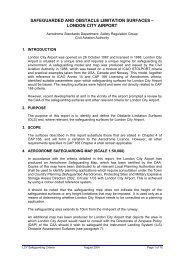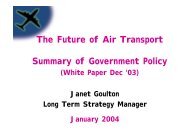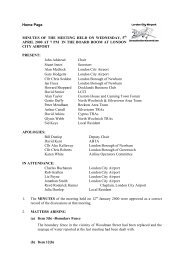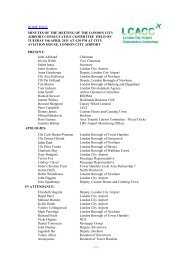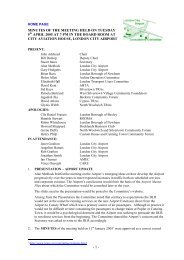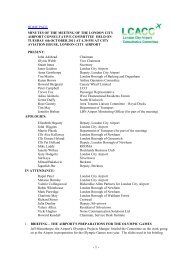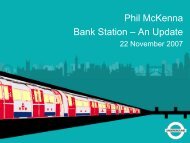The Mayor's Ambient Noise Strategy - Greater London Authority
The Mayor's Ambient Noise Strategy - Greater London Authority
The Mayor's Ambient Noise Strategy - Greater London Authority
Create successful ePaper yourself
Turn your PDF publications into a flip-book with our unique Google optimized e-Paper software.
<strong>The</strong> Mayor’s <strong>Ambient</strong> <strong>Noise</strong> <strong>Strategy</strong> Mayor of <strong>London</strong> 47<br />
3.47 City soundscapes are part of city culture. Enjoyment of historic open<br />
spaces and buildings can be affected by noise. Cultural events, including<br />
music, singing, and fireworks, can give joy to participants, though<br />
sometimes annoy others. A voluntary ban on the sale of the noisiest ‘air<br />
bombs’ to the public has been introduced, and the new Fireworks Act<br />
2003, enables the Government to introduce additional regulations,<br />
expected during 2004. 27 Most people will understand the positive role<br />
that occasional outdoor events play in the lives of cities. New street<br />
festivities or outdoor events can be better accepted when accompanied by<br />
measures to build local understanding and, ideally, participation. Some<br />
sound levels experienced in city festivities across the world risk physical<br />
hearing damage, such as through highly percussive or impulsive sounds.<br />
During consultation in preparation of the Cultural <strong>Strategy</strong>, some concern<br />
was expressed at the impact of public entertainment licensing on<br />
emerging artistic enterprises, particularly in small or low cost venues.<br />
Research was suggested to establish the extent of the problem and<br />
identify solutions. National licensing reform provides an opportunity to<br />
consider new options, in particular to ensure that the cost of licences<br />
fairly reflects public costs and does not discourage diversity and<br />
innovation in cultural provision. Relevant issues, including the evening<br />
economy, town centres, outdoor activities and leisure venues are<br />
considered in Chapters 4F and 5 below, and in the <strong>London</strong> Plan.<br />
3.48 While outdoor events may pose their own problems for noise control, the<br />
converse may also be true. High ambient noise levels may interfere with<br />
outdoor cultural activities and may even affect enclosed venues. Even<br />
where an indoor event itself is not affected by external noise, high ambient<br />
noise levels in the street may be off-putting to those wishing to attend.<br />
More broadly, improving environmental sound quality has key links with<br />
culture, including in education, music, sound art, museums and<br />
exhibitions, interdisciplinary work on soundscapes, soundmarks and<br />
soundwalks (see glossary), and community engagement. 28<br />
Energy <strong>Strategy</strong><br />
3.49 <strong>The</strong> Mayor’s Energy <strong>Strategy</strong> seeks to reduce <strong>London</strong>’s contribution to<br />
climate change through increases in energy efficiency and the proportion<br />
of renewable energy, such as solar. It also seeks to eradicate fuel poverty,<br />
so that <strong>London</strong>ers can adequately heat their homes at an affordable cost,<br />
and to secure jobs and economic development from improvements in<br />
energy supply and use. A <strong>London</strong> Energy Partnership will help implement<br />
this work across the capital.<br />
3.50 <strong>The</strong> <strong>London</strong> Climate Change Partnership has commissioned a study of the<br />
possible implications for <strong>London</strong> of future climate change. 29 Issues include



